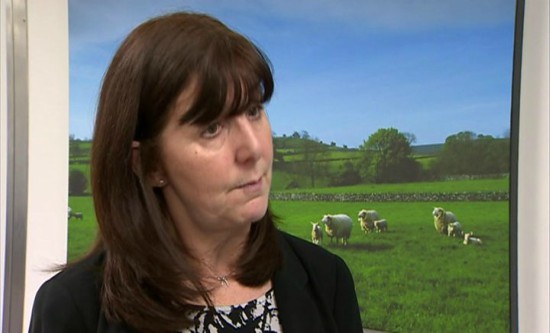
Welsh Labour Environment Minister Lesley Griffiths
When the French energy corporation EDF needed somewhere to dump radioactive mud from the Hinkley Point nuclear power station in Somerset, Welsh Labour was only happy to oblige, permitting it to dump 300,000 tonnes in the Severn estuary near Cardiff. True to form, this was after explicitly stating in 2015 that this would never happen on their watch.
The dredging licence was granted to EDF in 2013, giving it the right to discharge materials at Cardiff Grounds, a sandbank in the Bristol Channel. EDF needs to clear the sediment at Hinkley Point to allow barges to bring in construction materials. A petition has gained enough signatures to force the Welsh Assembly to debate the issue before it goes ahead.
Tim Deere-Jones, an independent marine pollution researcher, told The Guardian (14 October 2017) that the dumped sediment could re-concentrate into more powerful radioactive material and be washed ashore in storm surges: ‘Sediment in mudflats can dry out and blow ashore and fine sediment with radioactivity attached can transfer to the land in marine aerosols and sea spray.’
The mud to be dredged contains 50-year-old deposits from Hinkley Point, where radioactive material for Britain’s atomic weapons was produced. For good measure, the Welsh government is also ‘neither for or against’ a Westminster proposal to dump nuclear waste in bunkers under Welsh land.
Business as usual
To outsiders, particularly those who somehow retain hope in the the Labour Party, this shocking episode seems unfathomable: who in their right mind welcomes the dumping of nuclear waste, let alone on their own coastline?
However, this is simply the latest in a long line of appalling environmental decisions made by the Welsh Labour government. They are aggressively pro-nuclear, and First Minister Carwyn Jones has boasted that he would happily take Trident nuclear subs in south Wales in the event of Scottish independence. They continually approve white elephant developments despite opposition from environmental groups, and open cast coalmining still exists on a huge scale under their watch. In the 2016 Welsh Assembly elections, Friends of the Earth Cymru gave Welsh Labour 1.75/10 for their commitment to environmentally friendly policies, placing them just above UKIP.
Exploiting desperation
Labour’s reactionary actions are steeped in Wales’ economic deterioration. Retreating investment in search of cheaper labour elsewhere has left deindustrialisation and poverty in its wake.
While this has driven down living standards for the people who live here, for capitalists working in controversial and environmentally destructive sectors such as nuclear or open cast coalmining, regions like Wales are extremely appealing. Firstly, firms can take advantage of a desperate and cheap reserve army of labour. Secondly, and crucially, they will not face a government committed to protecting the environment; in fact they are likely to find one prepared to subsidise the corporation’s financial risk.
In places like Wales, politicians can exploit desperation and accrue short term capital through ‘job creation’, even if these jobs are dangerous and temporary. Welsh Labour demonises all who dare to oppose their short-termist, environmentally destructive strategies as being ‘anti-investment’ or ‘anti-job’. For the Welsh government, all that matters is the next election, the next headline, and they know that in a country as poor as Wales, ‘jobs’ are their main currency, even if this Faustian pact means destroying the earth.




